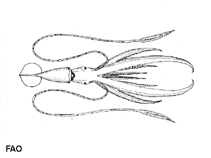Chiroteuthis veranii (Férussac, 1834)
Verany's long-armed squid
Classification / Names आम नाम | उपशब्द | CoL | ITIS | WoRMS
Cephalopoda | Oegopsida | Chiroteuthidae
Environment: milieu / climate zone / गहराई सीमा / distribution range पारिस्थितिकी
; गहराई सीमा 200 - 1700 m (संदर्भ 110525). Subtropical; 70°N - 65°S, 180°W - 180°E (संदर्भ 97142)
Distribution देश | ऐफ ऐ ओ क्षेत्र | Ecosystems | संयोग | भूमिका
Circumglobal, tropical, subtropical and Sub-Antarctic waters.
Length at first maturity / आकार / Weight / Age
परिपक्व अवधि: Lm ? range ? - ? cm Max length : 20.0 cm ML पुल्लिंग / अलिंग; (संदर्भ 97142)
Life cycle and mating behavior परिपक्व अवधि | पुनरुत्पत्ति | मछलीऔ का अंडे देना | Eggs | Fecundity | Larvae
Main reference
संदर्भ | संयोजक | सहयोगीयो
Bisby, F.A., M.A. Ruggiero, K.L. Wilson, M. Cachuela-Palacio, S.W. Kimani, Y.R. Roskov, A. Soulier-Perkins and J. van Hertum 2005 Species 2000 & ITIS Catalogue of Life: 2005 Annual Checklist. CD-ROM; Species 2000: Reading, U.K. (संदर्भ 19)
IUCN Red List Status
(संदर्भ 130435: Version 2025-1)
CITES status (संदर्भ 108899)
CMS (संदर्भ 116361)
Threat to humans
Human uses
मात्स्यिकी: व्यापारिक
| FishSource |
साधन
अधिक जानकारी
इंटरनेट स्रोत
BHL | BOLD Systems | CISTI | DiscoverLife | FAO(Publication : search) | Fishipedia | GenBank (genome, nucleotide) | GloBI | Gomexsi | Google Books | Google Scholar | Google | PubMed | Tree of Life | Wikipedia (Go, खोज) | Zoological Record



